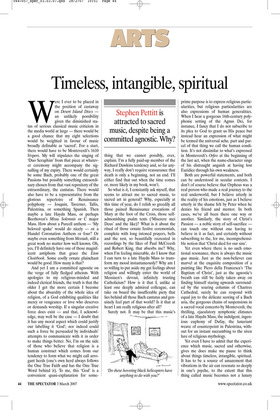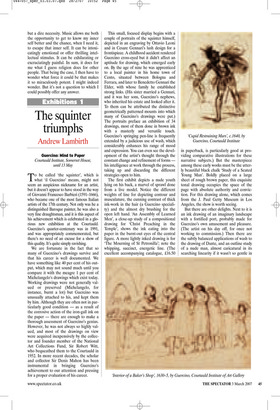Timeless, intangible, spiritual
Stephen Pettitt is attracted to sacred music, despite being a committed agnostic. Why?
Were I ever to be placed in the position of castaway on Desert Island Discs an unlikely possibility given the diminished status of serious classical music criticism in the media world at large — there would be a good chance that my eight selections would be weighted in favour of music broadly definable as ‘sacred’. For a start, there would have to be Monteverdi’s 1610 Vespers. My will stipulates the singing of ‘Duo Seraphim’ from that piece at whatever ceremony might accompany the signalling of my expiry. There would certainly be some Bach, probably one of the great Passions but possibly something extraordinary chosen from that vast repository of the extraordinary, the cantatas. There would also have to be a representative from the glorious repertoire of Renaissance polyphony — Josquin, Taverner, Tallis, Palestrina, or something Spanish. Then maybe a late Haydn Mass, or perhaps Beethoven’s Missa Solemnis or C major Mass. How about a Purcell anthem — ‘My beloved spake’ would do nicely — or a Handel Coronation Anthem or four? Or maybe even something from Messiah, still a great work no matter how well known. Oh, yes, I’ll definitely have one of those magnificent antiphons that grace the Eton Choirbook. Some coolly ornate plainchant would be good. How many is that?
And yet I am a committed agnostic on the verge of fully fledged atheism. With apologies to my religious-minded and indeed clerical friends, the truth is that the older I get the more certain I become about the absurdity of the whole idea of religion, of a God exhibiting qualities like mercy or vengeance or love who deserves or demands worship. If a singular creative force does exist — and that, I acknowledge, may well be the case — I doubt that it has any moral aspect which could justify our labelling it ‘God’; nor indeed could such a force be persuaded by individuals’ attempts to communicate with it in order to make things better. No, I’m on the side of those who believe that religion is a human construct which comes from our tendency to form what we might call arrogant herds (one’s own herd always follows the One True Faith and has the One True Word behind it). To me, this ‘God’ is a convenient quasi-explanation for some thing that we cannot possibly, ever, explain. I’m a fully paid-up member of the Richard Dawkins tendency and, so far anyway, I really don’t require reassurance that death is only a beginning, not an end. I’ll either find that out when the time comes or, more likely in my book, won’t.
So what is it, I constantly ask myself, that seems to attract me to sacred music, to sacred art in general? Why, especially at this time of year, do I relish so greedily all those pained Renaissance evocations of Mary at the foot of the Cross, those selfadmonishing psalm texts (‘Miserere mei Deus’ and the like)? What is it about the ritual of those ornate festive ceremonials, complete with long intoned prayers, bells and the rest, so beautifully recreated in recordings by the likes of Paul McCreesh and Robert King, that absorbs me? Why, when I’m feeling miserable, do I know that I can turn to a late Haydn Mass to transform my mood instantaneously? Why am I so willing to put aside my gut feelings about religion and willingly enter the world of Messiaen’s devout, infinitely trusting Catholicism? How is it that I, unlike at least one deeply admired colleague, can take on board the insufferable piety that lies behind all those Bach cantatas and genuinely feel part of that world? Is it that at heart I am really religious after all?
Surely not. It may be that this music’s prime purpose is to express religious particularities, but religious particularities are also expressions of human generalities. When I hear a gorgeous 16th-century polyphonic setting of the Agnus Dei, for instance, I fancy that I do not subscribe to its plea to God to grant us His peace but instead hear an expression of what might be termed the universal ache, part and parcel of that thing we call the human condition. It’s not dissimilar to what’s expressed in Monteverdi’s Orfeo at the beginning of the last act, when the name-character sings of his distraught anguish at having lost Euridice through his own weakness.
Both are powerful statements, and both can be understood in secular contexts. I don’t of course believe that Orpheus was a real person who made a real journey to the real underworld, but I believe utterly in the reality of his emotions, just as I believe utterly in the shame felt by Peter when he denies his friend and mentor. In both cases, we’ve all been there one way or another. Similarly, the story of Christ’s Passion — a noble story of self-sacrifice can touch one without one having to believe in it as fact, and certainly without subscribing to the, for me, incomprehensible notion that ‘Christ died for our sins’.
Yet even where there is no such emotional resonance, there is always the music qua music. Just as the non-believer can marvel at the exquisite composition of a painting like Piero della Francesca’s ‘The Baptism of Christ’, just as the agnostic’s breath can still be fairly taken away on finding himself staring upwards surrounded by the soaring columns of Chartres Cathedral, surely he can respond with equal joy to the delicate scoring of a Bach aria, the gorgeous chains of suspensions in a sacred vocal concerto by Monteverdi, the thrilling, ejaculatory symphonic climaxes of a late Haydn Mass, the indulgent, ingenious euphony of Dufay, the luxuriant weave of counterpoint in Palestrina, without for an instant succumbing to the siren lure of religious mythology.
Yet even I have to admit that the experience which music, sacred and otherwise, gives me does make me pause to think about things timeless, intangible, spiritual. It has to be a source of amazement that vibrations in the air can resonate so deeply in one’s psyche, to the extent that this thing called music becomes not a luxury but a dire necessity. Music allows me both the opportunity to get to know my inner self better and the chance, when I need it, to escape that inner self. It can be intoxicatingly emotional or offer thrilling intellectual stimulus. It can be exhilarating or excruciatingly painful. In sum, it does for me what I guess religion does for other people. That being the case, I then have to wonder what force it could be that makes it so miraculously potent. I might indeed wonder. But it’s not a question to which I could possibly offer any answer.











































































 Previous page
Previous page